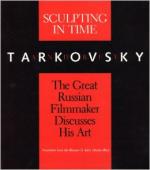
|
| Name: _________________________ | Period: ___________________ |
This test consists of 5 multiple choice questions, 5 short answer questions, and 10 short essay questions.
Multiple Choice Questions
1. What word refers to the falling action of a narrative in film?
(a) Ending.
(b) Falling placement.
(c) Denouement.
(d) Finale.
2. Whom does Tarkovsky write about in Chapter II who believed the poet had the gift of prophecy?
(a) Effendi Kapiyev.
(b) Pushkin.
(c) Alexander Dovzhenko.
(d) Alexander Blok.
3. What is the title of Chapter IV?
(a) The Stalker.
(b) The Beginning.
(c) After Nostalgia.
(d) Cinema's Destined Role.
4. Trokovsky writes in Chapter III that cinema is said to be a _____ art.
(a) Determined.
(b) Expansive.
(c) Composite.
(d) Communicative.
5. Tarkovsky writes in Chapter II, "Art does not think logically, or formulate a logic of behaviour; it expresses its own postulate of ____."
(a) Truth.
(b) God.
(c) Beauty.
(d) Faith.
Short Answer Questions
1. What book of the Bible is quoted in Chapter II in discussing Tarkovsky's Andrey Rublyov?
2. What Italian painter of the Venetian school and contemporary of Raphael does Tarkovsky discuss in Chapter II?
3. What novelist wrote The Possessed?
4. Tarkovsky writes in the Introduction, "I realized that I generally came to recognize my own working principles through questioning" what?
5. Tarkovsky states that cinema's unique aspect is this capturing and shaping of what?
Short Essay Questions
1. What types of imagery did Tarkovsky use in Ivan's Childhood? From where did he draw his ideas?
2. What does Tarkovsky write in Chapter II of art's aim in preparation of man?
3. How does Tarkovsky feel the director should view the audience? What credit does he give them?
4. What does Tarkovsky define a "masterpiece" as?
5. What does Tarkovsky say of cinematic "tricks" and special effects in Chapter III?
6. What was the first moving picture to be released? When and where was it released?
7. Describe the film Mirror. When was it produced?
8. What does Tarkovsky say of the role of screenwriters in Chapter III?
9. What does Tarkovsky define "the artist" as in the text? What is the artist's chief weapon and goal?
10. What does Tarkovsky write of his film school days in Chapter IV?
|
This section contains 840 words (approx. 3 pages at 300 words per page) |

|




